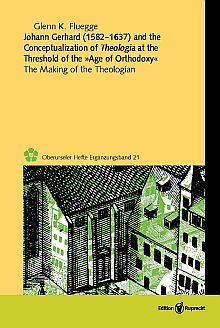Rezension
Concordia Journal, Winter 2020
What is theology? What makes a theologian? What do these questions mean for our understanding of personal faith and Christian life as they relate to the practice of theological education? In »Johann Gerhard (1582-1637) and the Conceptualization of Theologia at the Threshold of the Age of Orthodoxy« Glenn Fluegge investigates these questions in the light of history, offering keen insights for meeting the challenges of the present and the future. Fluegge is a professor of theology at Concordia University Irvine. The work is a revised version of his doctoral dissertation submitted to the theology faculty of the University of Pretoria, South Africa. Fluegge’s supervisor, Werner Klän, also on the faculty of the Lutherische Theologische Hochschule in Oberursel, Germany, has appended a German summary of the book. Robert Kolb contributed the foreword.
Fluegge’s study focuses on the work of Johann Gerhard, university professor of theology, ecclesiastical superintendent, and leading theologian of the Lutheran »Age of Orthodoxy.« While seeking to follow the teachings of Martin Luther, Gerhard utilized a methodology derived from Aristotelian philosophy as a framework for systematizing Christian doctrine. The goal was to exposit faithfully the teachings of the Bible in a way that promised a secure defense of Lutheran teaching against opposing views. Applying this disciplined approach, however, Gerhard quickly faced a basic, initial question: What is theology? Following dose on its heels were questions about the faith and life of the individual Christian and its connection to the theological task. While equipped with a new method, Gerhard was not operating in an academic vacuum. He was a pastor called to preach and teach the word of God − in the lecture hall, to be sure – but also to believers in the congregation, people living lives in faith. The practical purpose of theology was part of the reason for attaining theological knowledge. The project was about training faithful preachers and teachers, but also about cultivating personal piety as well as pastoral care for parishioners.
Fluegge introduces readers to Gerhard’s thinking about what theology is, and the reasons for it. Gerhard had inherited from the Wittenbergers an understanding of theology as a habitus, or disposition, necessary for the pastoral ministry. Originating as an Aristotelian concept, the humanist Melanchthon had reframed the idea of habitus in his textbook on logic following Aristotle’s categories for the purpose of describing the development of human virtues. Not merely concerned with moral and intellectual qualities, Melanchthon added knowledge and faith (including trust) to the virtues of a Christian with the result that the habitus was viewed as carrying out activities with deliberation in a particular context. As Fluegge explains, Gerhard advanced this definition to qualify theology as a habitus Θε?σδοτος which is mostly practical. The term was not Gerhard’s invention – Balthasar Meisner and others had been using it for a while − and Gerhard’s contributions were part of the greater conversation going on at the time. This expression, theology as a »God-given habitus,« which Gerhard differentiates from Aristotle’s concept of habitus derived from intellectual conditions, becomes »a mainstay in Protestant, and especially Lutheran, definitions of theologia throughout the period of Orthodoxy« (87).
In the Prooemium to his Loci Theologici, Gerhard formulated his concept of theologia in a way that reinforced what he believed to be most necessary for an understanding faithful to the Scriptures. Theologia, first of all, is doctrine, »built up from the Word of God, by which people are instructed in true faith and pious living for eternal life« (147). At the same time, theology also is »a God-given habitus conferred on a person by the Holy Spirit through the Word« (147). In this manner and by the habitus, a person is instructed in God’s word so that both the mind is illuminated and the heart moved to a life of good works. Along the way, the person is prepared and equipped to tell others the way of salvation and the true teachings of God's word so that they too may be led into the Christian faith and life. While the aim of theology as a habitus is not simple knowledge, but action, its ultimate end is the glorification of God.
With this formulation of theologia as a practical habitus, Gerhard was seeking to preserve the insights of Luther and other Wittenberg reformers of the sixteenth century within the changing context of his own seventeenth century. Gerhard clarified the relationship between professional theological practice and the personal practice of faith. The ability to preach, teach, refute error, and exercise pastoral care are important and not to be dismissed – they are part of the theological habitus. But they grow from the formation of personal faith and the practice of that faith in the Christian life. In the development of the theologian, »professional praxis is founded on personal faith-praxis« (231). This is key to Gerhard’s qualification of theology as »practical.«
Through his analysis of Gerhard’s writings on the nature of theology, Fluegge reveals the uniqueness of Gerhard’s understanding, and demonstrates that it has much to offer today. While theology is an academic discipline needed for carrying out the work of pastoral ministry, Fluegge reminds us that faith in Christ and life in him are the foundation. The theological task starts by hearing and learning the word of God; the Holy Spirit works faith and that faith is then believing and working. Professional practice of the ministry arises from personal faith and practice of that faith. Fluegge’s book is an excellent contribution not only to the study of Lutheranism in the era of Orthodoxy, but a welcome addition to the ongoing conversation about theological education in a variety of contexts. Thinking with Gerhard about the intellectual and spiritual formation of theology students, as well as their work as pastors, has meaning beyond Lutheran contexts and can bring benefit to the entire Christian community.
Gerhard Bode







